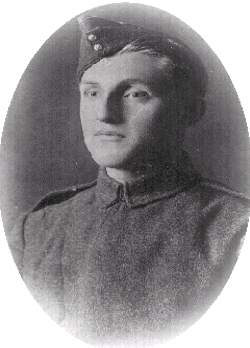Walter Harris Callow | |
|---|---|
 | |
| Born | 1896 |
| Died | 1958 (aged 61–62) |
| Occupation | Real estate agent |
| Known for | inventing the accessibility bus for veterans |
Walter Harris Callow (1896–1958) was a Canadian veteran who invented the accessibility bus for veterans returning from WW2 and others in wheelchairs (1947).[1][2] He designed and managed the Walter Callow Wheelchair Bus, while he himself was blind, quadriplegic and, eventually had both legs amputated. Callow planned trips for disabled veterans, tours of the countryside, picnics, sporting events, art classes and other activities. He was born in Parrsboro, Nova Scotia and became a resident of the Camp Hill Military Hospital for twenty years.
Biography
[edit]
| Part of a series on the |
| Military history of Nova Scotia |
|---|
 |
As a member of the Royal Flying Corps in Camp Mohawk, Ontario, Callow crashed in a test flight in 1918. He received a serious back injury and a heart condition. He continued on in a lumber business in Advocate, Nova Scotia. He eventually became bed-ridden in 1931 because of his injuries, the same year his mother and wife died and left him with a young child. He continued business by selling real-estate.
In 1937 Callow became a full-time resident of the Camp Hill Hospital and two years later he was blind and quadriplegic. While at the Hospital he established a board of directors and hired two secretaries. He established the Callow Cigarette Fund to send cigarettes to soldiers serving over-seas during World War II.
After the war, he turned his cigarette fund into a wheelchair coach service for disabled veterans (1947).[3] He started by having two custom-made buses built in Pubnico, Nova Scotia; five subsequent buses were built by Prevost, and smaller models by others followed. He named the company the "Callow Veterans' and Invalids' Welfare League" and established an office in Halifax. He worked tirelessly to make facilities accessible and to make visible the needs of those with physical disabilities. The Walter Callow bus system operated throughout Nova Scotia until 2019, and a single Callow bus operated out of Lethbridge, Alberta between 1954 and 1969.
Walter Harris Callow's funeral was conducted in Halifax with full military honours. The only time that Callow had the opportunity to ride on his bus is when his body was returned to Advocate to be buried.
Legacy
[edit]There was an unveiling of the Walter Callow Memorial Plaque at the Advocate cemetery on 10 August 2001.
The Walter Callow Wheelchair Bus ceased operations in 2018.[4]
See also
[edit]References
[edit]Endnotes
- ^ "Veteran had indomitable spirit: Paralyzed airman invented bus that accommodates wheelchairs. Halifax Daily News, Wednesday 26 September 2007" (PDF). Archived from the original (PDF) on 19 October 2013. Retrieved 24 June 2013.
- ^ Ottawa Citizen - 23 Aug 1950 Callow's bus had a hydrolic ramp. The following year an accessibility bus with a manual ramp was used in Toronto.
- ^ Carman Miller. The 1940s: War and Rehabilitation. in The Atlantic Provinces in Confederation. University of Toronto. 1993. p. 307
- ^ Wheelchair bus service turns 65, founder lauded. Chronicle Herald. 29 July 2012
Texts
- The Achievement of Walter Callow. Montreal Gazette. 26 February 1953
- The Story of the Callow Wheelchair Coach
- Wheelchair bus service turns 65, founder lauded. Chronicle Herald
- Walter Callow. A Challenge: Will You Help? Walter Callow's Veterans and Invalids Club. Halifax : Wm. Macnab & Son, 1947
- Lethbridge Herald. Caring and Courage. 25 November 1752, p. 9
- Montreal Gazette 22 March 1955